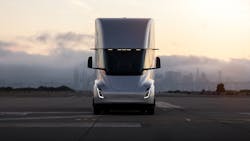Walmart Canada triples Tesla Semi order
Walmart Canada announced it has now reserved 130 battery-electric Tesla Semi trucks, increasing its previous commitment by more than 300%. Each unit requires a $20,000 deposit, so the initial investment appears to be at least $2.6 million.
"Tripling our reservation of Tesla Semi trucks is part of our ongoing effort to innovate the business and prioritize sustainability," said John Bayliss, senior vice president, Logistics and Supply Chain, Walmart Canada. "By converting 20% of our fleet to electric vehicles by the end of 2022 and committing to alternative power for all fleet vehicles by 2028, we are putting safety, innovation and sustainability at the forefront of our logistics network."
This move to grow a zero-emission fleet aligns with Walmart’s global target of zero emissions from all of its vehicles by 2040. There is a push to source 50% of its energy from renewable sources by 2025. Currently 29% is derived from clean power such as wind or solar. The company also is working with suppliers through an initiative called the Gigaton PPA (GPPA) Program to remove a gigaton of CO2 from its global supply chain. In the past three years, the 2,300 suppliers across 50 countries have reduced 230 million metric tons—20% of the total goal.
It also follows a larger $3.5 billion strategy announced by Walmart Canada to modernize its stores and supply chain infrastructure with an emphasis on e-commerce and customer experience.
Each unit requires a $20,000 deposit, so the initial investment appears to be at least $2.6 million.
Walmart immediately ordered 15 Tesla Semis (five for the U.S. and 10 for Canada) after Tesla CEO Elon Musk unveiled a prototype in November 2017. Other early adopters included J.B. Hunt Transport Services, Meijer Inc. and Loblaw, a Canadian grocery chain. Anheuser-Busch earmarked 40 that December.
The truck was initially planned for 2019 and is now scheduled for production in 2021.
On the plus side for the Canadian retailer, Tesla apparently had tested the truck and its battery system at its cold weather testing grounds near Delta Junction, Alaska. Some prototypes bearing Alaska license plates were seen on flatbed trailers traveling down the West Coast to the Fremont, Calif., facility, with several pictures making their way online.
About the Author
FleetOwner Staff
Our Editorial Team
Kevin Jones, Editorial Director, Commercial Vehicle Group
Josh Fisher, Editor-in-Chief
Jade Brasher, Senior Editor
Jeremy Wolfe, Editor
Jenna Hume, Digital Editor
Eric Van Egeren, Art Director
